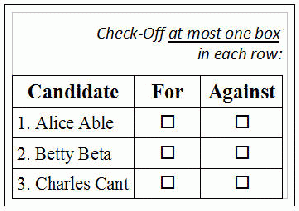The second article of this series, What's Wrong with First-Choice Voting?, explored deficiencies of First-Choice Voting (Plurality Voting), the voting protocol that we generally use today. That article was intended to make the point that we should use a better voting system.
The first article, Are
More Political Parties Possible Here? argued that a better system would be balanced, meaning that a voter could choose to cast a vote against a candidate as easily as for a candidate. Described in that article seems to be as simple a balanced voting system as
possible - allowing each voter to cast a single vote but to require it specified whether that vote is for or against a specific candidate. When counted, a vote for
a given candidate adds one and a vote against subtracts one from the net vote tally. This simple and natural example of balanced voting we will call, BV-1.
Other possibilities come to mind, however. A voter
could be allowed two (BV-2) or three (BV-3) votes in place of just one. Is there a voting system that is best?
It is not clear how to make that
judgment, but as important as voting is for democracy, it is surely a
question that is worth asking.
We can't dismiss the possibility that one of these systems, BV-5 for example, might be judged to be the best voting system, but that choice does seem arbitrary. But a system that does not seem so arbitrary is to allow a voter to cast as many votes as there are candidates. Accustomed as we are to casting only a single vote this may seem overly generous, but on further consideration, it appears to be a particularly good alternative.
A voter is asked to cast either a for or against vote for each candidate in the race; but abstention is offered as yet a third option. In effect, the voter partitions the candidates into three disjoint sets:
The candidates that the voter likes (or at least finds acceptable) will get a vote For (+1),
those the voter dislikes (or finds unacceptable) will get a vote Against (-1) and
about all the remaining candidates, the voter is undecided or ambivalent (0).
Thanks go to Steve Unger for pointing out the system of Approval Voting (AV is discussed at http://www.electology.org/) that is similar, though not balanced. With that system, the voter partitions the candidates into only two sets,
The candidates that the voter votes For (+1),
all the remaining candidates (0).
Recognizing the great similarity, this balanced system (with a three-way partition) will be called Balanced Approval Voting (BAV). Is this the best system of voting?
A curious feature of BAV is that typically, a voter does not indicate a first-choice candidate; the only way to do this would be to forgo the opportunity to vote For more than a single candidate. In this respect, BAV is nearly at the opposite pole from FCV which asks the voter only to specify a first choice from among the candidates. But much the same can be said of AV.
After the polls close, for BAV the votes For and Against each candidate are tallied and a net vote for each candidate is computed as the difference. These net vote counts tells us the net satisfaction with electing that candidate. A positive net vote means that number more voters would feel pleased than would feel displeased with the election of that candidate. Electing the candidate with the largest net vote would mean that the largest possible number of voters would be pleased rather than displeased with the outcome. Surely that is a result that we should be ready to accept and defend in a democracy.
A consideration in judging a voting scheme should be how stressful it will make voting. To a large extent this comes down to how accurately the ballot allows the voter express what he or she wants. Voters who feels unable to accurately express preferences for the candidates may feel cheated at the polls and may grow less inclined to vote in future elections. Much the same can be said for voters who feel pressured to make arbitrary (flip of a coin) decisions to satisfy what may seem like arbitrary demands of the ballot.
The first article of this series, Are More Political Parties Possible Here?, notes that balanced voting encourages elections to competitions between mort than just two viable candidates and that having more than two viable candidates naturally discourages polarized politics with its negative advertizing.
(Note: You can view every article as one long page if you sign up as an Advocate Member, or higher).






